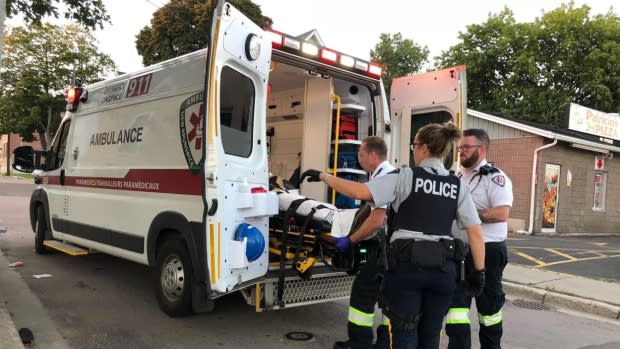PC government going ahead with judicial review of bilingual hiring demands for paramedics
New Brunswick's official languages commissioner says the Higgs government will go ahead with a judicial review aimed at resolving apparent contradictions between two rulings on bilingual hiring requirements for paramedics.
Michel Carrier told Radio-Canada that he was told by the attorney-general's office last Friday that the province will not abandon the review of an April labour ruling.

That's a reversal for Premier Blaine Higgs, who said Oct. 24, before he took power, that his government would drop the case.
"If I can deal directly with the people that are impacted, and the people that can solve the problem, that is always my first solution, rather than spending time in court," he said at the time.
He repeated that Nov. 19, when he announced changes to Ambulance New Brunswick designed to address staffing shortages. He said the government had "the intention" of dropping the review within 30 days after consultations with the paramedics' union.
The People's Alliance, which Higgs relied on to keep his minority government in power, also supports dropping the case and letting stand the April 2018 labour board decision by arbitrator John McEvoy..
But Carrier, who argues McEvoy made legal errors, told Radio-Canada that he believes the government realized it was better to have the courts clarify whether the decision was well-founded legally.
Liberals applied for review
The previous Liberal government had applied for the review because the McEvoy decision appeared to contradict a 2017 court order which resolved a lawsuit against the province.
That order, which the province agreed to and which was signed by Court of Queen's Bench Justice Zoël Dionne, said the Charter of Rights and Freedoms requires the province to provide ambulance services "of equal quality" in both languages in all areas of the province.
It cited Section 20 (2) of the Charter, which says any New Brunswicker "has the right to communicate with, and to receive available services from" any provincial institution in English and French.
To comply with that requirement, Ambulance New Brunswick tried to staff each two-paramedic ambulance crew with at least one bilingual paramedic.
McEvoy said in his labour ruling that led to staffing shortages and the interim fix of temporary hirings was interfering with seniority rights.
McEvoy suggested Ambulance New Brunswick could reduce bilingual service in areas of the province where there were fewer minority-language speakers, and could use a so-called "language line" linked to a dispatch office to provide translation.
The review is scheduled to be heard in January.

